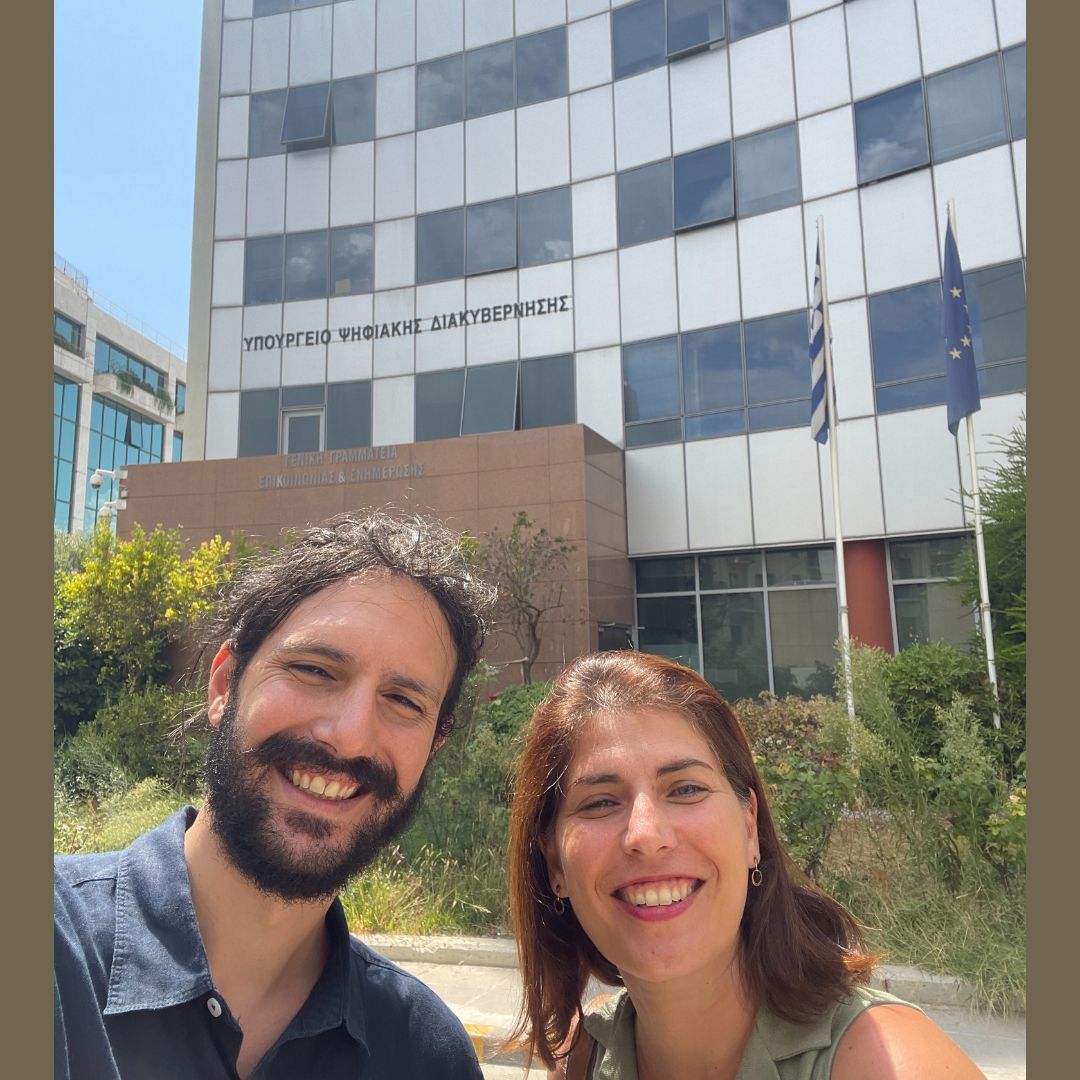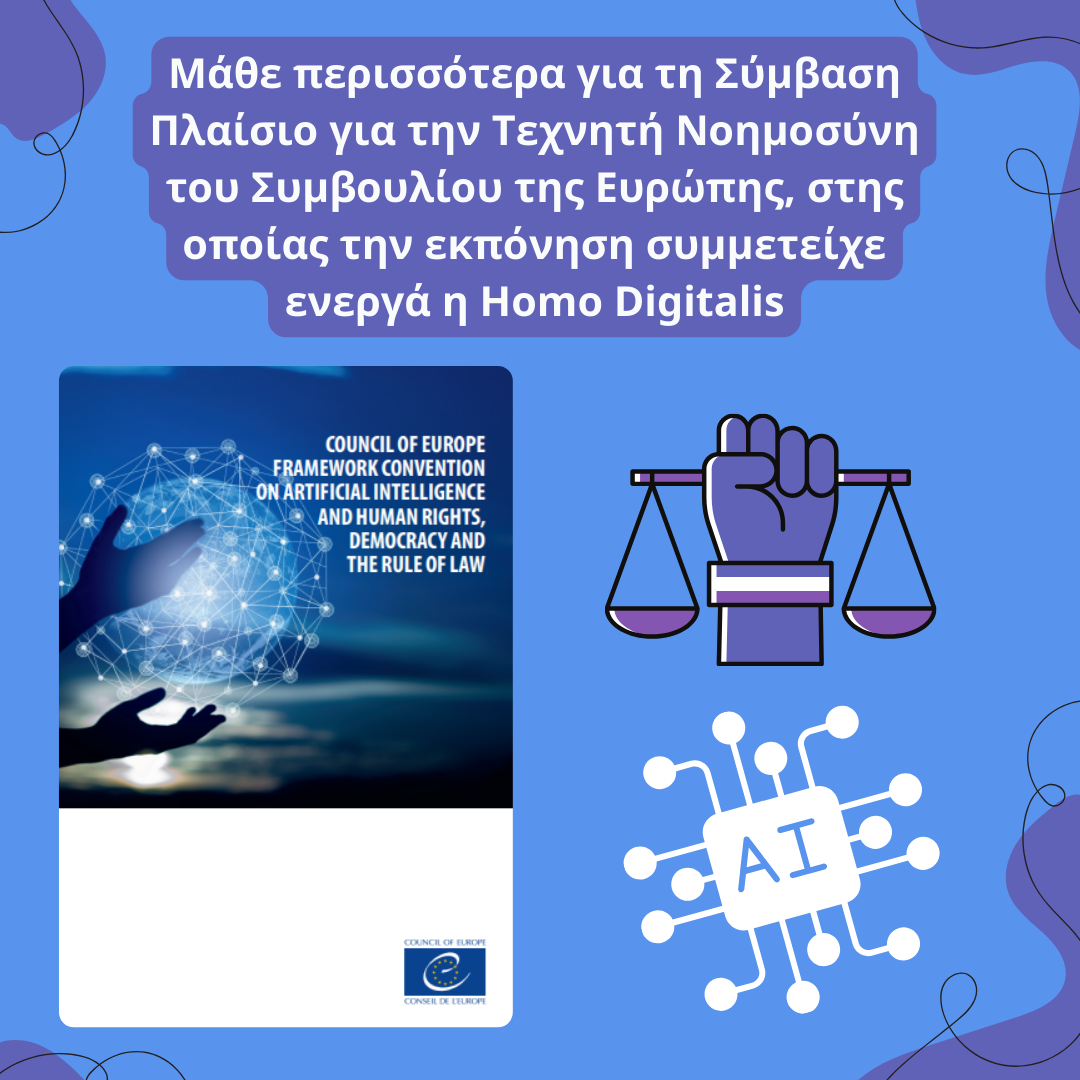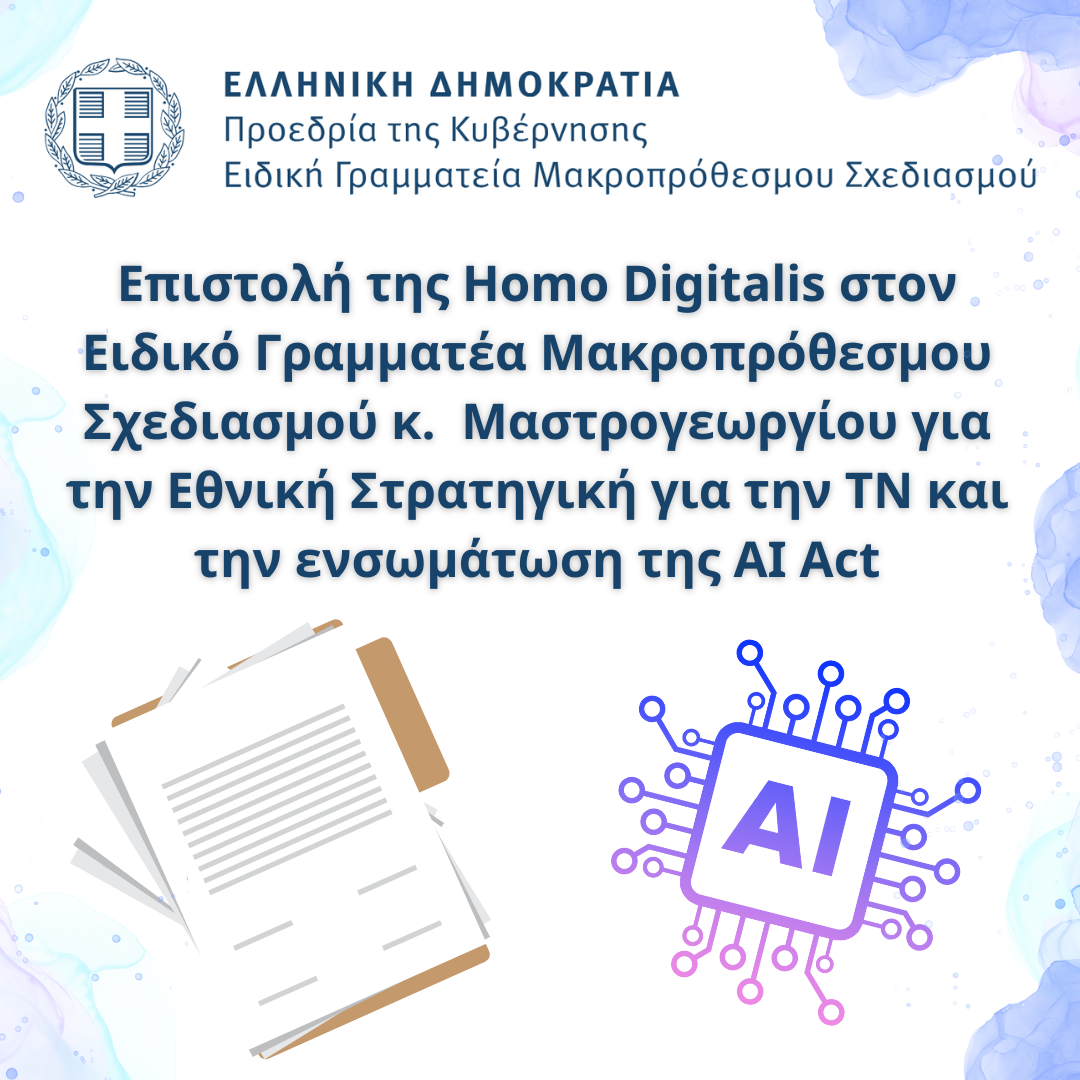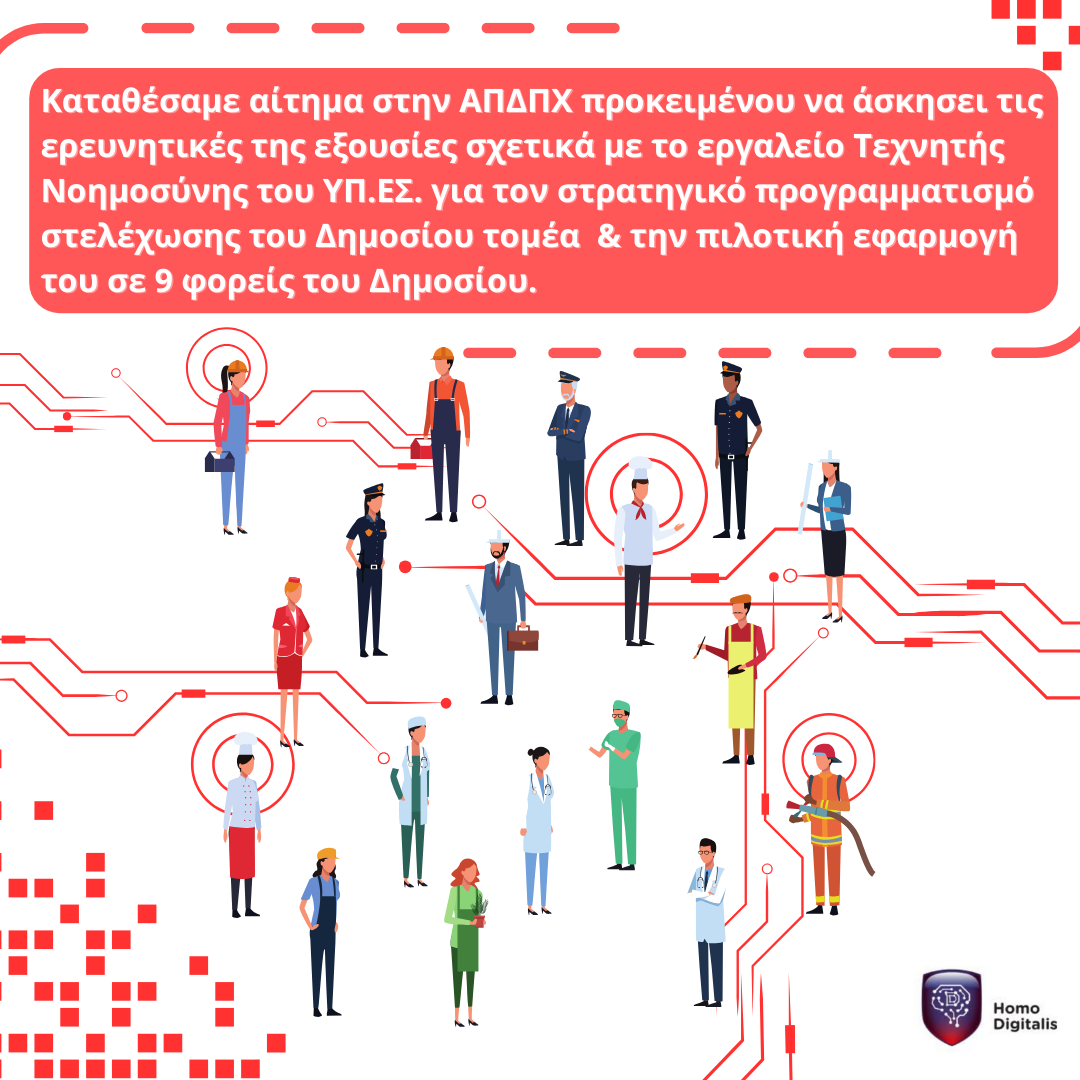We co-organize and participate in the Tech & Society Summit in Brussels
The Tech and Society Summit is approaching and will take place on Tuesday, 1st October in Brussels! This exciting conference, co-organized by EDRi in collaboration with Homo Digitalis and over 40 other organizations, will bring together leading experts, policymakers, and human rights advocates to discuss the intersection of technology and societal impacts in Europe. The summit will cover critical issues, ranging from digital rights and climate change to AI regulations, contributing to the shaping of a fair and equitable digital future for all.
We are excited that Eleftherios Chelioudakis will represent Homo Digitalis as a speaker at the session Visionary Roundtable: Building an EU Digital Enforcement Strategy. With important laws such as the Digital Markets Act (DMA), Digital Services Act (DSA), and AI Act, Eleftherios will highlight the actions of Homo Digitalis, discussing how these regulations can effectively protect rights and boost Europe’s competitiveness in the digital space.
Additionally, Homo Digitalis has been invited to participate in the session Fundamental Rights in Focus: Joint Efforts for Spyware Regulation in the EU, co-organized by the Centre for Democracy & Technology Europe (CDT Europe) and Amnesty International. In this session, key policymakers and civil society representatives will meet to explore ways to regulate spyware in the EU, and we will discuss our experiences from the latest related developments in Greece.
You can read more about the Tech and Society Summit and view its program here.
Homo Digitalis met with representatives of the Ministry of Digital Governance for the national implementation of the AI Act
September started with important meetings for Homo Digitalis in the context of the European Regulation on Artificial Intelligence (AI Act) at national level!
Specifically, on September 4, we had the honor to meet with the Ministry of Digital Governance and its representatives Mr. Vassilis Karkatzounis and Mr. Papagiotis Papaspiliopoulos in order to exchange views on the implementation of the AI Act in Greece. We were represented at the meeting by our Director for AI and Human Rights issues Lamprini Gyftokosta and our co-founder Eleftherios Chelioudakis. We would like to thank the representatives of the Ministry for their positive response to our request for a meeting, the and the very fruitful dialogue!
Translated with DeepL.com (free version)
Homo Digitalis participates in the European Commission's Open Consultation on General-Purpose AI
Yesterday, 18/9 Homo Digitalis submitted its responses to the European Commission’s Open Consultation under the title “FUTURE-PROOF AI ACT: TRUSTWORTHY GENERAL-PURPOSE AI”. The consultation covered issues concerning the future implementation of the AI ACT legislation and how to make the use of General-Purpose AI models trustworthy.
Homo Digitalis’ position paper on the Consultation was prepared by our organisation’s AI & Human Rights Director, Lamprini Gyftokosta and our member Tania Skrapaliori
You can read our statement here.
Participation of Homo Digitalis in the 52nd Book Festival
Homo Digitalis has the great honour to be present at the 52nd Book Festival taking place at the Pedion tou Areos.
Specifically, on Thursday 19 September at 20:15, our co-founder and President Elpida Vamvaka will participate as a speaker in a round table organized on the main stage of the festival by the Association of Book Publishers (S.E.B.) & the Hellenic Comics Academy on the topic “Is art written with AI?”
The discussion will be moderated by Panagiotis Papageorgiou (Lawyer, Member of the Greek Comics Academy) and Dimitris Doukoglou (illustrator, presenter, stand-up comedian).
Other important speakers of the round table include Vassilis Vlahokyrikakos (Associate Professor of Human-Computer Interaction) , Abraham Kawa (Author, Translator & Theorist of Culture) and George Nathaniel (IT and Management Consultant).
You can find out more about the full Festival programme here.
Learn more about the Council of Europe's Framework Convention on Artificial Intelligence, in the drafting of which Homo Digitalis was actively involved.
The Council of Europe has published an important overview of the “Framework Convention on Artificial Intelligence and Human Rights, Democracy and the Rule of Law,” the first international legally binding instrument for AI.
The AI Treaty “aims to ensure that activities within the lifecycle of artificial intelligence systems are fully consistent with human rights, democracy and the rule of law, while being conducive to technological progress and innovation.”
For more than 4 years, since July 2020, Homo Digitalis has been actively involved in the relevant processes of the Council of Europe, initially participating in the CAHAI (Ad Hoc Committee on Artificial Intelligence) in the Policy Development and Legal Frameworks Working Groups, and subsequently in the Council of Europe’s Committee on Artificial Intelligence (CAI). Throughout this period, we had the honor of closely collaborating with civil society organizations, academic experts, member delegations, the Presidents of the Committees and Working Groups, and the Secretariat of the Council of Europe’s Committee on Artificial Intelligence in the development of the AI Convention.
Our co-founder and Executive Director, Eleftherios Chelioudakis, has represented Homo Digitalis in the relevant processes for the past 4 years.
Despite the limitations in the text of the Convention, which we have discussed in detail, we eagerly anticipate its adoption and implementation by the Member States of the Council of Europe. The treaty will be open for signature on September 5, 2024.
You can read the related overview here.
We submitted an Open Letter to the Special Secretary of Foresight Strategy about the National AI Strategy and the enforcement of the AI Act
Today, 1/8/2024, on the occasion of the entry into force of the AI Act, Homo Digitalis sent a letter to the Special Secretary of Foresight Strategy of the Hellenic Government, Mr. Giannis Mastrogiorgiou, regarding the National Strategy for AI and the incorporation of the AI Act into national law! In addition, we communicated our concerns to the Prime Minister’s Office and the Ministry of Digital Governance.
Among other things, we raise critical questions about the national governance and oversight model, the creation of regulatory sandboxes (No. 57) and how the Greek public will be informed when subjected to the use of AI systems that create profiles or make decisions about them in the provision of public services.
At Homo Digitalis, we believe that the next steps of the Greek government will be crucial for the effective or not defence of digital rights in Greece, at a time when AI is a reality in our daily lives. The proper incorporation of such a technical and legally complex legislation into national law and the solutions adopted to address the ethical and social issues that arise are crucial for all of us.
You can see the full text of our letter here.
We call on the Greek DPA to investigate the Ministry of Interior for the use of artificial intelligence algorithms for the reallocation of employees in the public sector
On 9 July Homo Digitalis filed a request (no. 5812/9.7.2024) before the Greek Data Protection Authority, in order for the latter to exercise its investigative powers against the Ministry of Interior.
In particular, following the Authority’s Decision 16/2024 in April 2024, by which it had imposed a record fine of 400,000 euros on the Ministry of Interior for significant breaches of data protection legislation, the Ministry is again in the spotlight, this time for the artificial intelligence tool it is developing for strategic staffing planning in the public sector.
The tool concerns the reallocation of existing staff and the estimation of the needs for new staff, while it will be piloted in 9 public sector institutions, namely the Development Programmes Organisation and Management Unit, the Independent Public Expenditure Authority, the Public Employment Service, the Athens General Hospital “G. Gennimatas Hospital, the Municipality of Thessaloniki, the Region of Attica, the Ministry of Education and Religious Affairs, the Ministry of Environment and Energy and the Ministry of Culture and Sports.
The project is expected to be completed in December 2025, at a cost of €11,708,543.
Because the tool needs to include functionalities for the collection, management and analysis of personal data, Homo Digitalis had filed a letter on 15 April 2024 before the then Minister of Interior Ms.Kerameos and the Data Protection Officer of the Ministry, in which it raised key questions regarding both the compliance required with the legislation on the protection of personal data and the legislation on the use of artificial intelligence and other emerging technologies in the public sector (Law 4961/2022). However, the Ministry did not provide any response, even after a written reminder of our request on 30 May, forcing us to address the DPA to investigate thoroughly the development, implementation and piloting of this tool and the implications for the rights of public sector employees.
You can see our request here (EL).
We give a lecture on AI ACT at company bora
Tomorrow, June 20, Homo Digitalis will give a talk-seminar on AI Act before the workforce and partners of the company bora.
Specifically, Homo Digitalis’ AI & Human Rights Manager, Lamprini Gyftokosta, in a 1-hour web presentation in English, will take a deep dive into the important provisions of the new legislation and discuss relevant compliance challenges with the audience!
Many thanks to bora for the kind invitation to host this seminar, and especially to Anastasios Arampatzis, Joe Pettit & David Turner!
You can learn more about bora here.
If you would also like to invite Homo Digitalis to provide a relevant seminar to your employees, you can express your interest at info@homodigitalis.gr
Homo Digitalis speaks at the 2nd Colour of Surveillance Conference
Homo Digitalis has the great honour and pleasure to speak at the 2nd European Colour of Surveillance Conference “Liberation Practices in times of Fascism”, which this time is being held on 26 & 27 June in Berlin by the organisations Equinox Initiative for Racial Justice, International Women* Space and Weaving Liberation!
Specifically, Homo Digitalis’ Director of Human Rights & AI, Lamprini Gyftokosta, will give a speech in the framework of the Workshop “Blue: the colour of surveillance In Greece: lessons from challenging Migration Tech” during the second day of the conference!
We would like to thank the organizers for the kind invitation and hospitality!
You can learn more about the conference programme here.
Translated with DeepL.com (free version)








